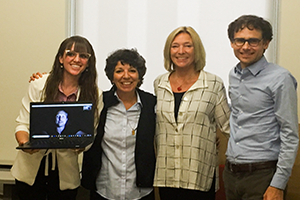Communications
PhD Graduate Explores Human Connection and Technology in Public Diplomacy

At AU’s School of Communication, PhD students are creating new knowledge at the intersection of media, democracy and technology.
Samantha Dols, PhD
"Agency, Emotion, and Imagination: Theorizing Connection in Public Diplomacy”
Imagine this: you see an old shipping container, repainted in brilliant gold, standing in the middle of a city square. Step inside, and you enter another world. State-of-the-art audiovisual equipment brings you face-to-face with a citizen from another country, eager to engage in a conversation with you in real time. You leave feeling like you made a sincere connection with someone you might otherwise never have met.
This describes the experience of thousands of ordinary citizens who participated in Shared_Studios' Portals, the subject of a case study by recent SOC PhD graduate Samantha Dols. Her research provides new insights into how humans form meaningful connections and shows how technology, applied thoughtfully, can help us transcend barriers of distance and culture.
Dols’ research provides new ideas about how humans form relationships that can be broadly applied in public diplomacy. Through the Portals project, she observed, and the data confirmed, that “human connection is malleable,” and when people engage in activities that evoke imagination and emotion, they create stronger, more durable connections. As Dols explains, the magic of the Portals experience is that it “affords people the chance to interact with others in a novel setting so that they might begin to reimagine their own social contexts in relation to others."
The new PhD graduate recommends Portals specifically for public diplomacy practitioners as a means to create bridges between societies and groups within a society. She notes the model allows for people to have “unmediated conversations that transcend the typical geographical, political, and cultural borders they often encounter.”
Connective technologies that enable live interactions also ensure that Portals, different from many digital communication media, “can’t be experienced passively…it compels its participants to be present and reactive in real-time.”
For Dols, the SOC PhD program offered a good balance between research and practice. She credits an incredible support team, which included SOC professors Benjamin Stokes, Maggie Stogner, and Rhonda Zaharna for helping to shape her research.
The School of Communication is proud to share the work of PhD students, like Dols, whose research expands the boundaries of human knowledge and has real-world impact. Learn more about the PhD program in communication studies, here.
